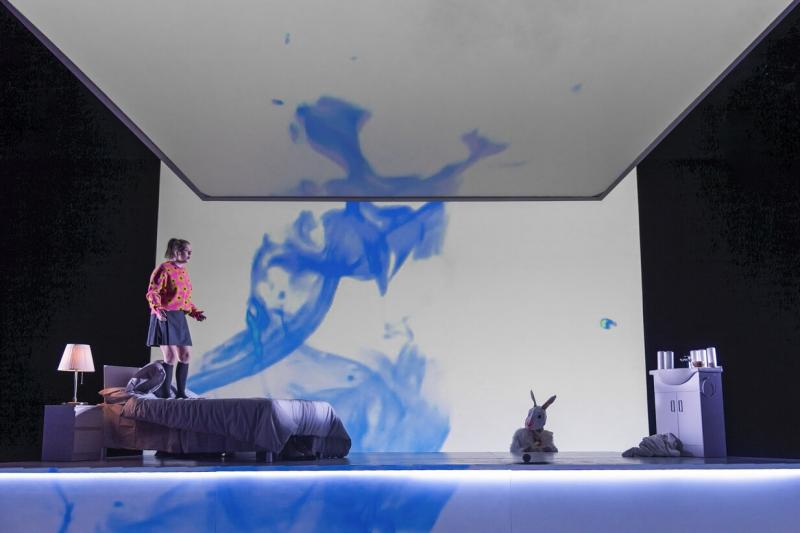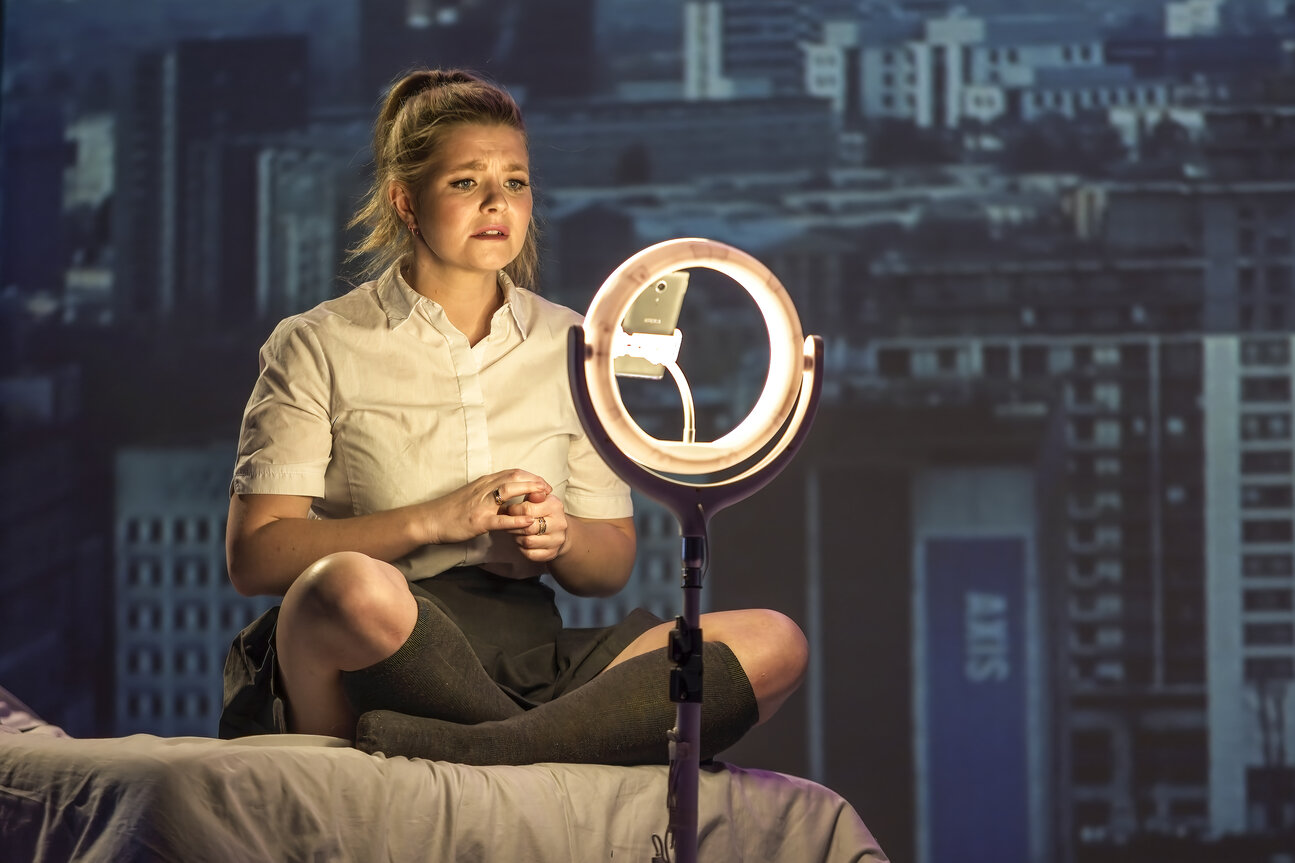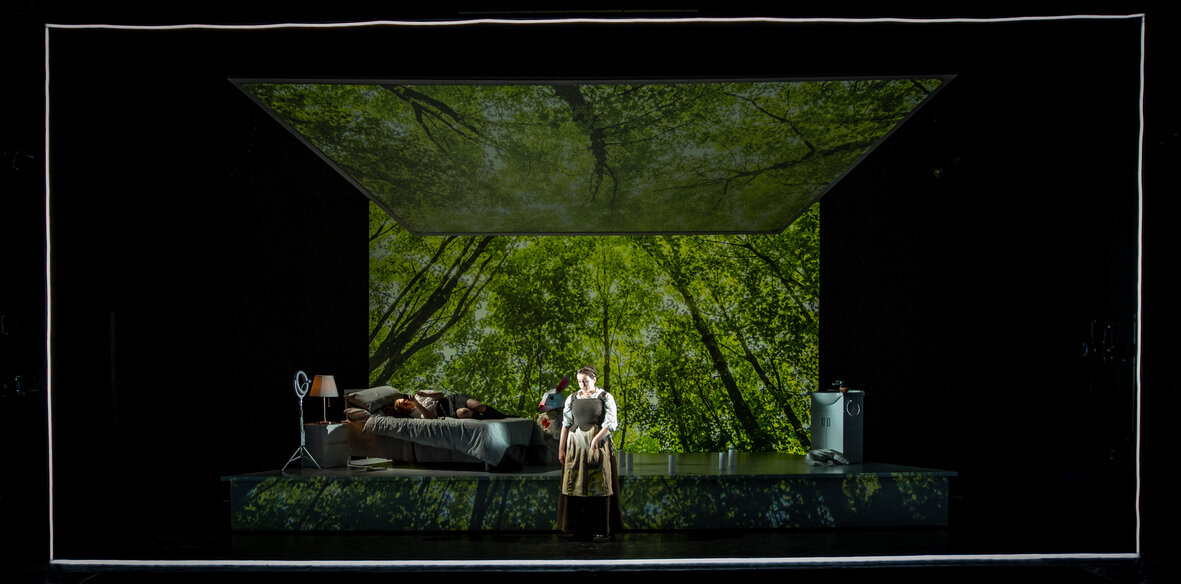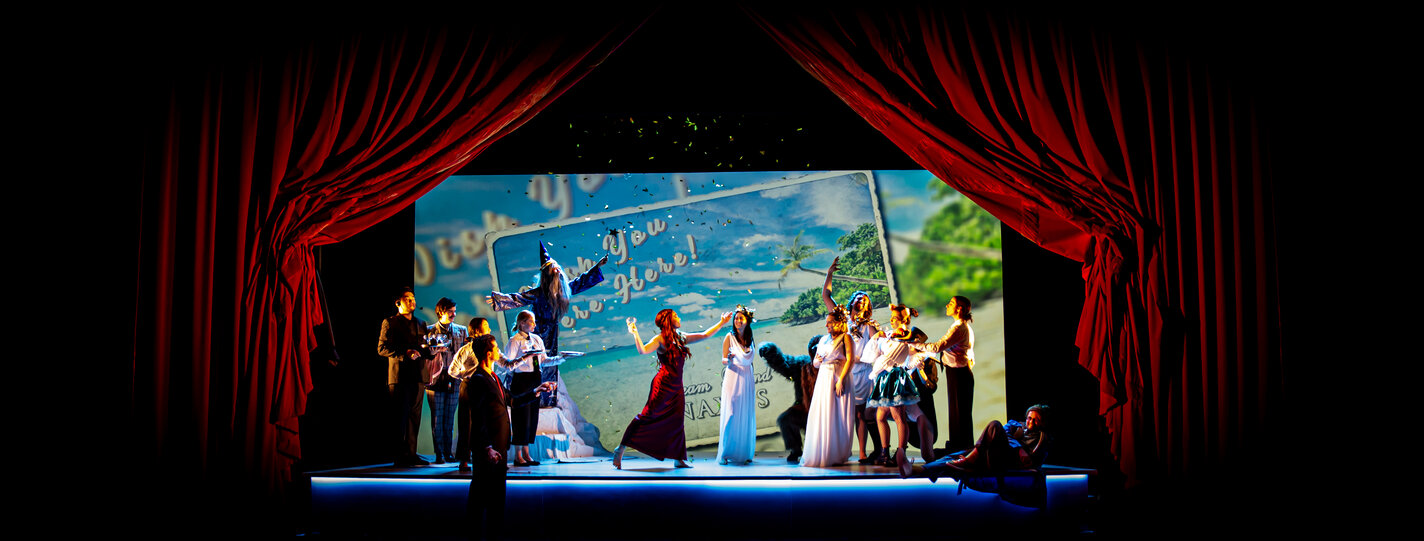Opera Triple Bill, Royal Academy Opera review - three centuries of female suffering | reviews, news & interviews
Opera Triple Bill, Royal Academy Opera review - three centuries of female suffering
Opera Triple Bill, Royal Academy Opera review - three centuries of female suffering
This operatic triptych never quite finds its footing

When we first meet Sarah, the teenage heroine of Freya Waley-Cohen’s WITCH, she’s alone in her bedroom Googling “How to stop feeling shitty?”. She’s being bullied and sexualised by boys at school, but she could just as easily be asking on behalf of any one of her operatic forebears: Manon; Carmen; Armida; Alcina; Butterfly; Elvira.
This triple bill, which frames Waley-Cohen’s new work with Monteverdi and Strauss’s takes on the abandoned and betrayed Ariadne/Arianna, offers a statement about the female experience – AKA operatic variations on feeling shitty.
Too often lectures when it should live its own theatrical life
Waley-Cohen, a Royal Academy alumna, steps into new territory with this substantial new work, premiered as part of the RAM’s Bicentenary celebrations by the creative dream-team of director Polly Graham and conductor Ryan Wigglesworth.
The source-material is rich and intriguing: Rebecca Tamas’s poetry collection Witch, Waley-Cohen’s own family history with Salem witch trials, as well as the sedimented layers of female power, anger and resistance that run right through opera, from Monteverdi to today. But so much anger and emotion, so much history, doesn’t come lightly or willingly, and the result too often lectures when it should live its own theatrical life, gives us chapter and verse instead of flesh and feeling.
 Hurt and angry, schoolgirl Sarah (Sophie Sparrow, above) is drawn into an online coven of witches, whose Insta-friendly affirmations and incantations begin and end in cyberspace. But when her own spells take magic into the real-world, she’s drawn into a connection with Jane (Bernadette Johns, below), a 16th-century Scottish woman accused of witchcraft.
Hurt and angry, schoolgirl Sarah (Sophie Sparrow, above) is drawn into an online coven of witches, whose Insta-friendly affirmations and incantations begin and end in cyberspace. But when her own spells take magic into the real-world, she’s drawn into a connection with Jane (Bernadette Johns, below), a 16th-century Scottish woman accused of witchcraft.
The parallel structure should amplify, but there’s just too much material and too little time for either Jane or Sarah to be much more than a vessel for the often undigested ideas of Ruth Mariner’s libretto. It’s hard not to think of James Macmillan’s The Confesssion of Isobel Gowdie, the wordless ferocity and tenderness, the layers of incantatory magic and incense-heavy chant that the composer found in the same story.
 The interest here is mostly in the orchestra. Waley-Cohen’s instinct for colour – Jane’s muted world set against the flickering, percussive brightness of Sarah’s – is keen, and there’s a cumulative energy and fizz to the tiny motifs that circle and repeat like musical mantras and spells, crisply brought out under Wigglesworth’s direction. But too often the vocal parts sit heavy on top, ornamenting but never driving action whose climax is all hat and no rabbit.
The interest here is mostly in the orchestra. Waley-Cohen’s instinct for colour – Jane’s muted world set against the flickering, percussive brightness of Sarah’s – is keen, and there’s a cumulative energy and fizz to the tiny motifs that circle and repeat like musical mantras and spells, crisply brought out under Wigglesworth’s direction. But too often the vocal parts sit heavy on top, ornamenting but never driving action whose climax is all hat and no rabbit.
Sparrow is an engaging heroine – sweet-voiced and youthful, passionate without being prissy – and well supported by her contrasting coven-members Nina Korbe and Kathleen Nic Dhiarmada. Johns (a powerful Composer earlier in the Prologue to Ariadne auf Naxos) finds subtle gradations of texture in the more contained role of Jane, helped by Graham’s careful direction and Hayley Egan’s evocative video designs, the open up closed spaces into whole worlds, both digital and natural.
 You can see the logic behind the first half’s two contrasting Ariadnes – the distilled tragedy of Monteverdi’s solo lament and Strauss’s overflowing riot of a comedy – but the jolt from Elizabeth Kenny’s trio of theorbos to Wigglesworth’s suddenly gaudy orchestra was severe, with Graham failing to either collide or connect the two worlds visually. Strong performances from Will Pate’s agonised Music Master and Liam Bonthrone’s Dancing Master – all vocal ease and nimble delivery – supplied a foil to Johns’ intensity, with only Dhiarmada’s unusually contained Zerbinetta remaining a cipher in this colourful riot.
You can see the logic behind the first half’s two contrasting Ariadnes – the distilled tragedy of Monteverdi’s solo lament and Strauss’s overflowing riot of a comedy – but the jolt from Elizabeth Kenny’s trio of theorbos to Wigglesworth’s suddenly gaudy orchestra was severe, with Graham failing to either collide or connect the two worlds visually. Strong performances from Will Pate’s agonised Music Master and Liam Bonthrone’s Dancing Master – all vocal ease and nimble delivery – supplied a foil to Johns’ intensity, with only Dhiarmada’s unusually contained Zerbinetta remaining a cipher in this colourful riot.
The future of Arts Journalism
You can stop theartsdesk.com closing!
We urgently need financing to survive. Our fundraising drive has thus far raised £49,000 but we need to reach £100,000 or we will be forced to close. Please contribute here: https://gofund.me/c3f6033d
And if you can forward this information to anyone who might assist, we’d be grateful.

Subscribe to theartsdesk.com
Thank you for continuing to read our work on theartsdesk.com. For unlimited access to every article in its entirety, including our archive of more than 15,000 pieces, we're asking for £5 per month or £40 per year. We feel it's a very good deal, and hope you do too.
To take a subscription now simply click here.
And if you're looking for that extra gift for a friend or family member, why not treat them to a theartsdesk.com gift subscription?
more Opera
 Orpheus and Eurydice, Opera Queensland/SCO, Edinburgh International Festival 2025 review - dazzling, but distracting
Eye-popping acrobatics don’t always assist in Gluck’s quest for operatic truth
Orpheus and Eurydice, Opera Queensland/SCO, Edinburgh International Festival 2025 review - dazzling, but distracting
Eye-popping acrobatics don’t always assist in Gluck’s quest for operatic truth
 MARS, Irish National Opera review - silly space oddity with fun stretches
Cast, orchestra and production give Jennifer Walshe’s bold collage their all
MARS, Irish National Opera review - silly space oddity with fun stretches
Cast, orchestra and production give Jennifer Walshe’s bold collage their all
 Káťa Kabanová, Glyndebourne review - emotional concentration in a salle modulable
Janáček superbly done through or in spite of the symbolism
Káťa Kabanová, Glyndebourne review - emotional concentration in a salle modulable
Janáček superbly done through or in spite of the symbolism
 Buxton International Festival 2025 review - a lavish offering of smaller-scale work
Allison Cook stands out in a fascinating integrated double bill of Bernstein and Poulenc
Buxton International Festival 2025 review - a lavish offering of smaller-scale work
Allison Cook stands out in a fascinating integrated double bill of Bernstein and Poulenc
 Tosca, Clonter Opera review - beauty and integrity in miniature
Happy surprises and a convincing interpretation of Puccini for today
Tosca, Clonter Opera review - beauty and integrity in miniature
Happy surprises and a convincing interpretation of Puccini for today
 Hamlet, Buxton International Festival review - how to re-imagine re-imagined Shakespeare
Music comes first in very 19th century, very Romantic, very French operatic creation
Hamlet, Buxton International Festival review - how to re-imagine re-imagined Shakespeare
Music comes first in very 19th century, very Romantic, very French operatic creation
 Falstaff, Glyndebourne review - knockabout and nostalgia in postwar Windsor
A fat knight to remember, and snappy stagecraft, overcome some tedious waits
Falstaff, Glyndebourne review - knockabout and nostalgia in postwar Windsor
A fat knight to remember, and snappy stagecraft, overcome some tedious waits
 Salome, LSO, Pappano, Barbican review - a partnership in a million
Asmik Grigorian is vocal perfection in league with a great conductor and orchestra
Salome, LSO, Pappano, Barbican review - a partnership in a million
Asmik Grigorian is vocal perfection in league with a great conductor and orchestra
 Semele, Royal Opera review - unholy smoke
Style comes and goes in a justifiably dark treatment of Handelian myth
Semele, Royal Opera review - unholy smoke
Style comes and goes in a justifiably dark treatment of Handelian myth
 Le nozze di Figaro, Glyndebourne review - perceptive humanity in period setting
Mostly glorious cast, sharp ideas, fussy conducting
Le nozze di Figaro, Glyndebourne review - perceptive humanity in period setting
Mostly glorious cast, sharp ideas, fussy conducting
 Fidelio, Garsington Opera review - a battle of sunshine and shadows
Intimacy yields to spectacle as Beethoven's light of freedom triumphs
Fidelio, Garsington Opera review - a battle of sunshine and shadows
Intimacy yields to spectacle as Beethoven's light of freedom triumphs
 Dangerous Matter, RNCM, Manchester review - opera meets science in an 18th century tale
Big doses of history and didaction are injected into 50 minutes of music theatre
Dangerous Matter, RNCM, Manchester review - opera meets science in an 18th century tale
Big doses of history and didaction are injected into 50 minutes of music theatre

Add comment